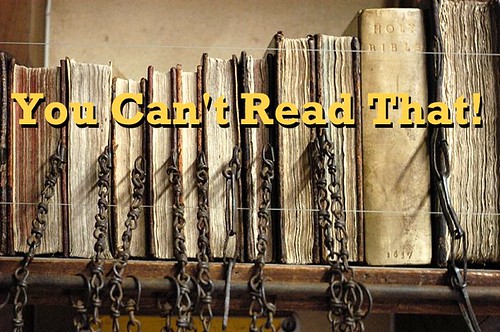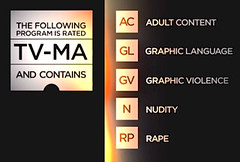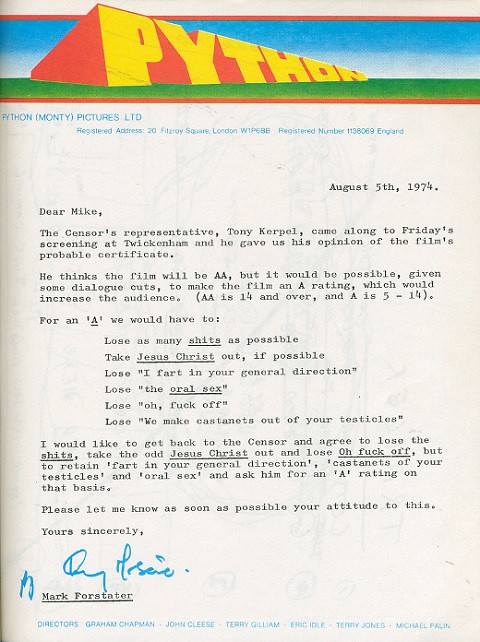You Can’t Read That! is a periodic post featuring banned book reviews and news roundups.

YCRT! Rant
Another school year has begun and we’re in for a fresh round of book challenges and bannings. This essay provides an excellent overview of educational censorship, and discusses the idea of providing parental advisory ratings for books on school reading lists and library shelves. Here’s another essay on the topic of ratings.
In reviewing news of book challenges and bans, I read article after article about parents and watchdog groups showing up at school board meetings to demand the removal of books containing “violence,” “adult language,” “inappropriate material,” “anti-capitalist themes,” “anti-Christian values,” or just plain “darkness.” These sound like categories from a TV parental advisory screen, don’t they?
 Change “the following program” to “this book” and you could stick this label on the cover of half the young adult and mainstream literary novels … even some nonfiction textbooks … commonly assigned in middle and high school classrooms.
Change “the following program” to “this book” and you could stick this label on the cover of half the young adult and mainstream literary novels … even some nonfiction textbooks … commonly assigned in middle and high school classrooms.
I’m afraid this is exactly what a growing number of parents and conservative watchdog groups want: simple, easy-to-understand rating placards for every book in every school, even books in the children’s section of public libraries and bookstores.
Parents want book ratings for what they believe to be good reasons. Religious and conservative watchdog groups want them for a more sinister reason: to facilitate wholesale banning.
A few parents and watchdog groups, the conscientious ones, actually read the books they target. When they show up at school board meetings, they’re prepared to cite specific passages from the books they want to ban. Granted, most of those who complain merely read out-of-context excerpts handed them by someone else, and haven’t read the books in question, but somewhere along the line someone has.
What would happen if books had parental advisory ratings? Parents, school administrators, and bluenoses in general wouldn’t bother to read them. They’d go with ratings alone, and the number of challenges and bannings would balloon. In no time at all, it would be nearly impossible to find a book with an AC (adult content) rating on a school reading list or library shelf. No understanding-the-book-in-context required. No reading required. No thinking required. AC=burn the witch!
Who would review books and come up with parental advisory ratings? Would it be committees of teachers, authors, and literary critics? Are you kidding? It would be the very religious and conservative watchdog groups who want to control what your children read. A book might get a “Graphic Language” rating for a single “damn.” One mention of masturbation would doom a book, never mind a sympathetic homosexual character. History texts not promoting American exceptionalism would be branded unbalanced. And who would know what the books really contain?
I try not to overreact to school book bannings. Young folks find out about great books by word of mouth, and if they hear of a book they want to read they will read it, whether it’s banned at their school or not. What will be missing is classroom discussion guided by teachers who know the material, because teachers won’t be allowed to assign or discuss anything not on their school’s approved reading list.
Parental advisory ratings for books? I can’t think of a more destructive exercise in “dumbing down.”
YCRT! News
Students and community members are protesting conservative attempts to sugar-coat American history textbooks in Jefferson County, Colorado. And talk about sugar-coating: one school board member wants students to be taught that America voluntarily ended slavery. The College Board opposes the teaching of false history, but the protests have so far been to no avail: the Jefferson County school board plans to go ahead with the proposed history curriculum review.
“’Hello, there, little one,’ the man greeted amicably. ‘I am the Reverend Albus Dumbledore, and this is my wife, Minerva. Welcome to Hogwarts School of Prayer and Miracles!’” It’s probably a joke, but maybe not: Grace Ann, concerned mother, is writing a fundamentalist Christian version of Harry Potter, with Barack Obama replacing Voldemort. The first link, and this one, contain screamingly funny excerpts. Please, please, be for real, Grace Ann!
A Drake University student newspaper has been pulled from circulation, but it’s not the usual story of top-down campus censorship. University students protested a front-page ad for a local pregnancy crisis center by confiscating copies of the paper and destroying them. The pregnancy crisis center in question is not a medical facility: its purpose is to prevent women from obtaining abortions. The university, and the newspaper’s student staff, calls the protest an act of vandalism and vows to continue running ads for the bogus pregnancy crisis center.
A school district in a Dallas, Texas suburb suspended seven books after parental complaints. Students in one high school class were midway through reading Garth Stein’s novel The Art of Racing in the Rain when school officials took their copies away. Parents, in challenging the seven books, objected to sex scenes, references to homosexuality, a description of a girl’s abduction, and a passage that criticized capitalism. After a backlash from alumni and other parents, six of the seven books were reinstated, but The Art of Racing in the Rain remains on the banned list. The incident prompted a New Yorker contributor to write one of the better short essays I’ve read, What Kind of Town Bans Books?
In Rochester, Minnesota, a parent complained about Louise Erdritch’s novel The Painted Drum, which had been assigned to English students at a local high school. The complaint centered on sexual content the parent judged unsuitable for 10th graders. In a bit of good news, a review committee read the book and elected to keep it on the reading list.
Another good essay: Chocolate Wars, Mr. Pucker, and Being a Banned Books Test Subject. Since the subject of this essay is Robert Cormier’s novel The Chocolate War, here’s a link to my review, which includes commentary on why it continues to be a target of book banners.
YGBSM. John Green’s mega-hit YA novel The Fault in Our Stars has been banned from Riverside, California middle schools. A single parent, apparently, complained about profanity and references to sex. John Green’s reaction is blockquote-worthy:
I guess I am both happy and sad.
I am happy because apparently young people in Riverside, California will never witness or experience mortality since they won’t be reading my book, which is great for them.
But I am also sad because I was really hoping I would be able to introduce the idea that human beings die to the children of Riverside, California and thereby crush their dreams of immortality.
The graphic novel Persepolis once again came under attack, this time at a high school in Chatham, Illinois, after a single parent demanded it be removed from a 12th grade English class reading list. The school’s first reaction was to take copies from students who were reading it as an assignment, but the school board overruled administrators and Persepolis was reinstated.
Distantly related to graphic novels, cartoons continue to enrage fanatical Muslim fundamentalists mild-mannered midwestern college lecturers: Michigan Lecturer Alerts Campus Police to Drawing of Beheading, Claims He’s ‘Against Censorship, But…’
Keep on keepin’ on, librarians, our real civil libertarians!
And now, for something completely different …
